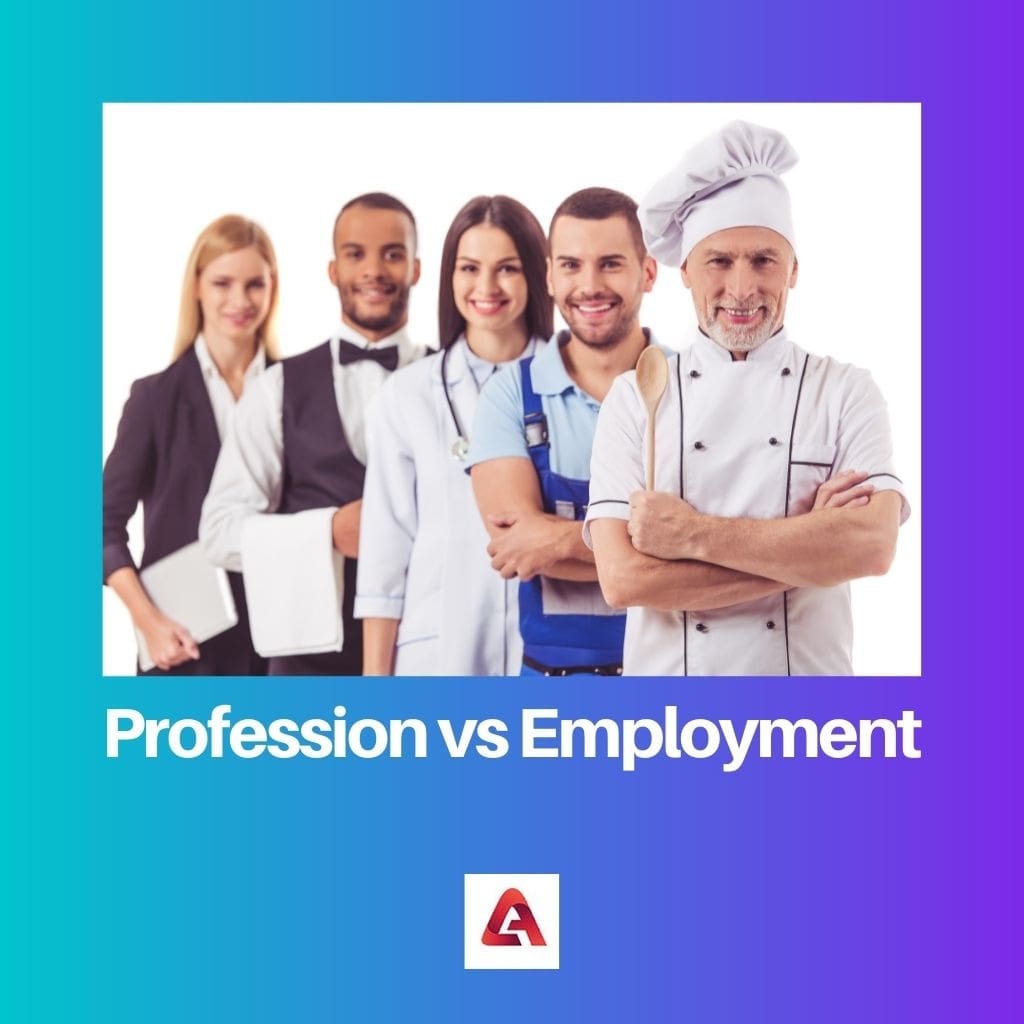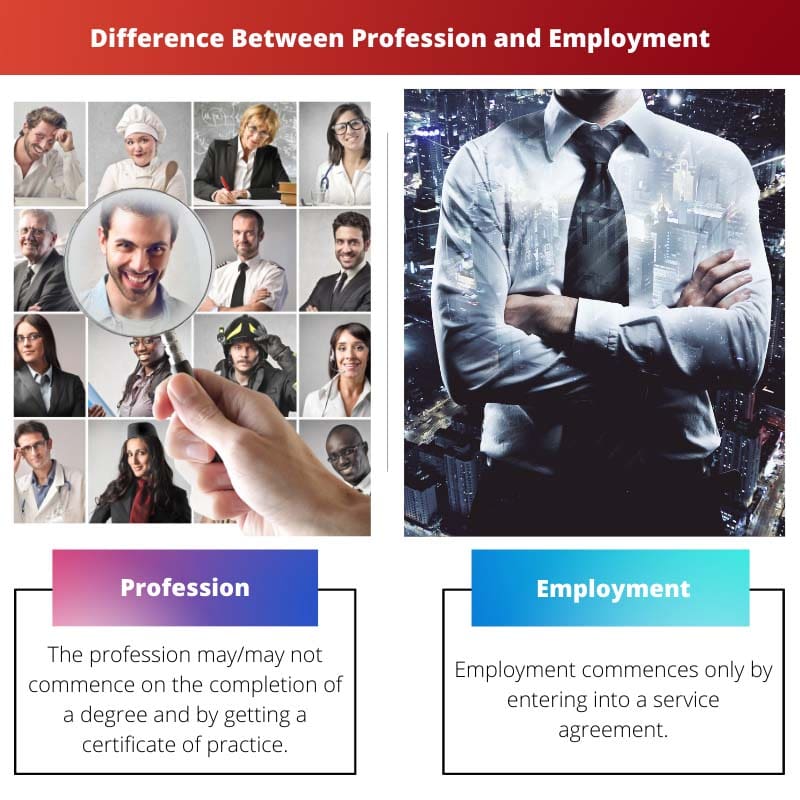Profession refers to an individual’s chosen occupation or vocation, often aligned with their education, skills, and personal interests. Employment, on the other hand, specifically denotes the act of being engaged in paid work or holding a job within a particular organization or industry.
Key Takeaways
- Entry requirements: Professions have specialized education and training requirements. Employees may not require specialized qualifications.
- Regulation: Professions are regulated by professional bodies, while employment is subject to general labor laws and regulations.
- Autonomy: Professionals exercise more autonomy in decision-making, while employees follow employer-set guidelines and policies.
Profession vs Employment
The difference between profession and employment is the main objective of a profession is to provide service; on the contrary, the aim of employment is to earn income in the form of a salary by providing satisfactory work to the employer.

Comparison Table
| Feature | Profession | Employment |
|---|---|---|
| Definition | Requires specialized knowledge and skills applied with a focus on service. Often governed by a code of ethics. | Working for an employer in exchange for regular compensation (salary or wages). |
| Education & Training | Typically requires advanced degrees, certifications, and ongoing professional development. | Educational requirements vary, but may include specific degrees, diplomas, or on-the-job training. |
| Work Environment | May have more autonomy and control over work schedule and tasks (depending on the profession). | Less autonomy, with tasks and schedules typically dictated by the employer. |
| Compensation | Income can vary depending on experience, expertise, and demand. May be paid by salary, fees, or commissions. | Fixed salary or wage, with potential for benefits and bonuses. |
| Primary Goal | Service to the public or a specific client base. | Fulfilling the employer’s objectives and completing assigned tasks. |
| Risk | May have some entrepreneurial risk, especially for freelancers or those starting their own practice. | Lower risk, with job security often dependent on employer performance and economic factors. |
| Examples | Doctor, Lawyer, Engineer, Accountant | Retail worker, Factory worker, Administrative assistant, Teacher (public school) |
What is Profession?
A profession refers to a specialized vocation or occupation that requires a specific set of skills, knowledge, and expertise. Professionals typically undergo formal education and training in their chosen field, and they adhere to a code of ethics and conduct. Professions are characterized by a commitment to serving the public or a specific community and are often regulated by governing bodies or professional organizations.
Characteristics of Professions
1. Specialized Knowledge and Skills
Professions are distinguished by the acquisition of specialized knowledge and skills related to a particular field. This expertise is typically acquired through formal education, training programs, and practical experience. The depth of knowledge sets professionals apart from general practitioners in other occupations.
2. Ethical Standards
Ethical considerations are a fundamental aspect of any profession. Professionals are expected to adhere to a set of ethical standards that guide their behavior and decision-making. Ethical guidelines help maintain the trust of clients, patients, or the public, and violations may lead to professional consequences.
3. Formal Education and Training
Most professions require a formal education and training process. This often involves obtaining a relevant degree or certification from accredited institutions. Continuous professional development may be necessary to stay current with advancements in the field and to meet the changing demands of the profession.
4. Licensing and Regulation
Many professions are subject to licensing and regulatory requirements. Government bodies or professional organizations establish these regulations to ensure that practitioners meet specific standards of competence and ethical conduct. Licensing is often a prerequisite for practicing a profession legally.
5. Service to Society
A key characteristic of professions is their commitment to serving the greater good or a specific community. Professionals contribute to the well-being of individuals, organizations, or society as a whole through their expertise and services.
Examples of Professions
Professions encompass a wide range of fields, each with its own set of requirements and responsibilities. Some examples include:
1. Medicine
Medical professionals, including doctors, nurses, and allied health professionals, diagnose, treat, and prevent illnesses, promoting the health and well-being of individuals.
2. Law
Legal professionals, such as lawyers and judges, play a crucial role in interpreting and upholding the law. They provide legal advice, represent clients, and ensure justice is served.
3. Engineering
Engineers design, build, and maintain infrastructure, technologies, and systems. Their work spans various disciplines, including civil, electrical, and mechanical engineering.
4. Education
Educators and teachers are professionals dedicated to imparting knowledge and skills to students. They play a vital role in shaping the future through education.
5. Accounting
Accountants and financial professionals manage financial records, provide financial advice, and ensure compliance with accounting standards and regulations.

What is Employment?
Employment refers to the relationship between an individual and an organization or employer, where the individual provides labor or services in exchange for compensation. It is a fundamental aspect of the economic and social fabric of any society, playing a crucial role in individuals’ livelihoods and overall economic development.
Types of Employment
1. Full-Time Employment
Full-time employment involves working a standard number of hours per week, typically 35 to 40 hours. Employees under full-time contracts often receive benefits such as health insurance, retirement plans, and paid leave.
2. Part-Time Employment
Part-time employment entails working fewer hours than a full-time position. Part-time employees may enjoy flexibility but often receive fewer benefits than their full-time counterparts.
3. Temporary Employment
Temporary employment involves hiring individuals for a specific period, often to meet short-term project needs or to cover staff shortages. Temporary workers may not receive the same benefits as permanent employees.
4. Contractual Employment
Contractual employment involves a formal agreement between an employer and an employee for a specified duration. The terms and conditions, including compensation and responsibilities, are outlined in the contract.
5. Freelance or Self-Employment
Freelancers and self-employed individuals work independently, often on a project-by-project basis. They have the flexibility to choose their clients and set their work schedules but are responsible for managing their own taxes and benefits.
Employment Rights and Responsibilities
1. Employment Contracts
Employment contracts outline the terms and conditions of employment, including job responsibilities, compensation, working hours, and benefits. Both employers and employees have legal obligations outlined in these contracts.
2. Labor Laws
Labor laws vary by country and jurisdiction but generally cover aspects such as minimum wage, working hours, overtime pay, and workplace safety. These laws aim to protect the rights and well-being of employees.
3. Equal Employment Opportunity
Equal employment opportunity ensures that individuals are not discriminated against based on factors such as race, gender, age, or disability. Laws and policies are in place to promote a fair and inclusive work environment.
Unemployment
Unemployment occurs when individuals who are willing and able to work cannot find suitable employment. Various factors, such as economic downturns, technological changes, and structural shifts in industries, contribute to unemployment.

Main Differences Between Profession and Employment
- Nature of Work:
- Profession: In a profession, individuals typically engage in work that requires specialized knowledge, skills, and expertise. Professions often involve a higher level of education or training and may have specific ethical standards or codes of conduct.
- Employment: Employment refers to a broader concept where individuals work for an employer in exchange for compensation. Employment can include a wide range of jobs, from entry-level positions to managerial roles, and may not necessarily require specialized professional qualifications.
- Autonomy and Control:
- Profession: Professionals often have a higher degree of autonomy and control over their work. They may make independent decisions based on their expertise and are responsible for the outcomes of their actions.
- Employment: In traditional employment, individuals may have varying levels of autonomy depending on their position, but decisions are often made by higher-level management, and employees follow established procedures and guidelines.
- Education and Training:
- Profession: Professions typically require extensive education, training, and often formal certifications or licenses. This education is specialized and directly related to the specific field of the profession.
- Employment: Employment may not always require a high level of specialized education. Many jobs may only necessitate basic skills or on-the-job training, making them more accessible to a wider range of individuals.
- Code of Ethics:
- Profession: Professions often have a code of ethics that guides the behavior and decision-making of professionals. This code emphasizes integrity, confidentiality, and a commitment to serving the best interests of clients or the public.
- Employment: While some companies may have a code of conduct, it may not be as formalized or specific as the ethical standards found in many professions.
- Career Development:
- Profession: Careers in professions typically involve a structured path of advancement, with opportunities for specialization, leadership roles, and continued professional development.
- Employment: Career development in employment may vary widely, with opportunities for advancement depending on the industry and the individual’s skills, experience, and performance.
- Income Structure:
- Profession: Professionals often have a more structured income based on their qualifications, experience, and the market demand for their specialized skills. Income may include fees for services rendered or a salary.
- Employment: Employment income can be more diverse, ranging from hourly wages for hourly workers to salaries for full-time employees. It may also include additional benefits such as health insurance, retirement plans, and bonuses.
- Client Relationships:
- Profession: Professionals often establish direct relationships with clients, whether individuals or organizations, and may be personally accountable for the quality of their work and client satisfaction.
- Employment: In traditional employment, individuals may not have direct client relationships, and their work is often part of a larger organizational structure where accountability is distributed among team members and management.

- https://illinoislawreview.org/wp-content/uploads/2016/05/Long.pdf
- https://ideas.repec.org/a/nos/voprob/2012i1p74-92.html
- https://ageconsearch.umn.edu/record/292803/files/uk-0021.PDF

This article is certainly a valuable source for understanding the nuances of profession and employment. The scholarly tone is commendable.
Indeed, Evans Phoebe. The scholarly tone greatly enhances the credibility of the content.
This piece provides a comprehensive comparison of profession and employment, offering valuable insights.
I concur, Mmason. The depth of the comparison is noteworthy.
While the article’s detail is commendable, the language was too complex for easy understanding. It could be more reader-friendly.
I believe simplifying the language could benefit a wider audience.
I understand your point, Logan09. Accessibility could be improved.
This article explores in depth the difference between profession and employment, making it quite clear to even the most uninitiated reader. It’s a well-documented comparison that provides great insight.
Hats off to the author. This is very informative.
I heartily agree, Bsmith. This article certainly makes the topic more accessible.
The complexity of the topic is conveyed effectively. It’s a stimulating read for those interested in the subject matter.
Absolutely, Adrian Thompson. A well-structured article overall.
This article is well researched and presents a clear distinction between profession and employment. The content is very informative.
Agreed, Simpson Lilly. It’s commendable how well the differences are articulated in this piece.
It’s really interesting to see the detailed differences between profession and employment. The depth of analysis is much appreciated.
Absolutely agree, Wilkinson Ava. The comparison is enlightening.
This article is a helpful resource for anyone seeking clarity on these concepts.
The definitive differences between profession and employment are clearly delineated. The article is quite impressive.
Absolutely, Roberts Cameron. The clarity of the comparison is commendable.
The article effectively underscores the distinctions between profession and employment, providing a scholarly discussion of the topic.
I couldn’t agree more, Anthony James. A solid scholarly approach.
I appreciate the depth of analysis in this piece.
While the content is detailed and informative, it lacks a touch of humor. A bit of light-heartedness could enhance the readability.
Interesting perspective, Tpalmer. Injecting humor could indeed make it more engaging.